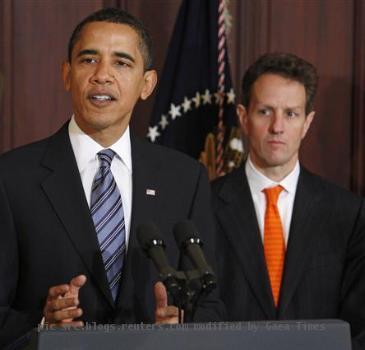Division among world leaders on managing economic recovery; boost spending or attack deficits?
By Martin Crutsinger, APSunday, June 27, 2010
World leaders strive to manage economic recovery
TORONTO — World economic powers are struggling to manage the global recovery after surviving the worst financial crisis in decades.
Leaders of the Group of 20 leading industrial and major developing countries, wrapping up their summit Sunday, are agreeing on separate strategies to sustain the fledgling economic comeback.
The United States insisted that stimulus spending is needed to bolster the rebound. But other countries, worried about a Greek-style debt crisis, prefer cutting government spending and raising taxes to attack ballooning deficits.
While these conferences regularly attract protests against the trend toward economic globalization, demonstrations on Saturday turned violent in downtown Toronto. Police made more than 400 arrests after demonstrators broke off from a crowd of peaceful protesters, setting fire to four police cruisers and smashing windows. Police used shields, clubs, tear gas and pepper spray to push back the protesters who tried to head toward the security fence surrounding the summit site.
Officials planned a final round of talks on global imbalances and tighter standards for the banking system. The goal is to avoid the kind of financial crisis that struck in the fall of 2008 — and brought about the summit.
Leaders of the older Group of Eight industrial powers believed that the expanded collection of nations, which includes major developing countries including China, Brazil and India, was a better forum to develop a broad economic strategy.
Reaching a consensus, however, has proved difficult.
Mindful that open signs of dissension could worry financial markets, the G-20 leaders sought to minimize their differences. They agreed that deficits must be tamed in the long term, but that different countries may use different tactics in the short term, depending on their levels of indebtedness.
The U.S. did receive some support for its warnings against cutting government stimulus too quickly.
“If we act hastily, if we are excessive in adopting the new fiscal policy adjustments, we could jeopardize the growth we have achieved,” said Brazil’s economic minister, Guido Mantega.
French President Nicolas Sarkozy told reporters that President Barack Obama “clearly talked about the risks of debt and deficit” in the U.S.
U.S. Treasury Secretary Timothy Geithner said leaders understood they must work together to make sure the global recovery stays on track.
Online:
Summit site: g8.gc.ca/home/
Tags: Barack Obama, Canada, North America, Ontario, Summits, Toronto, United States, World-summit




